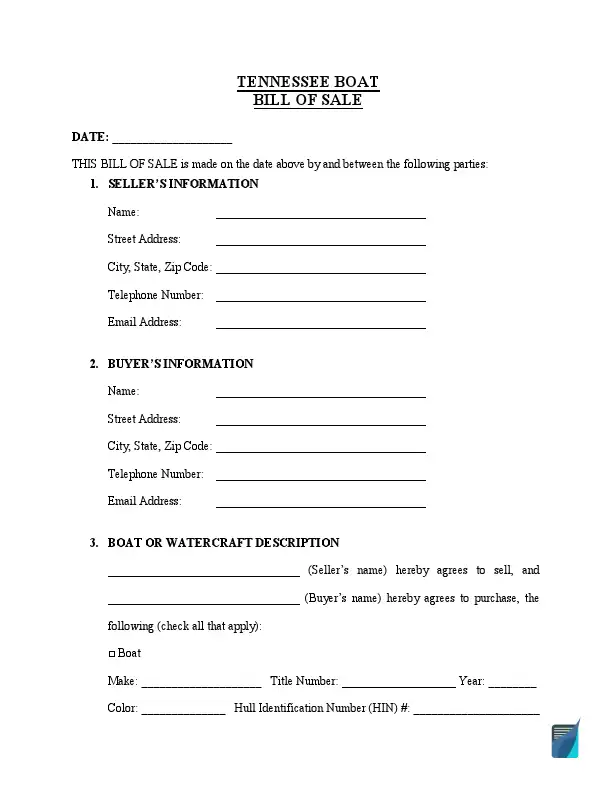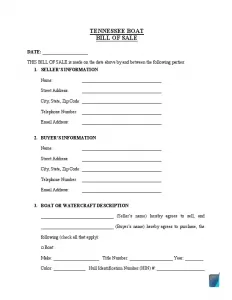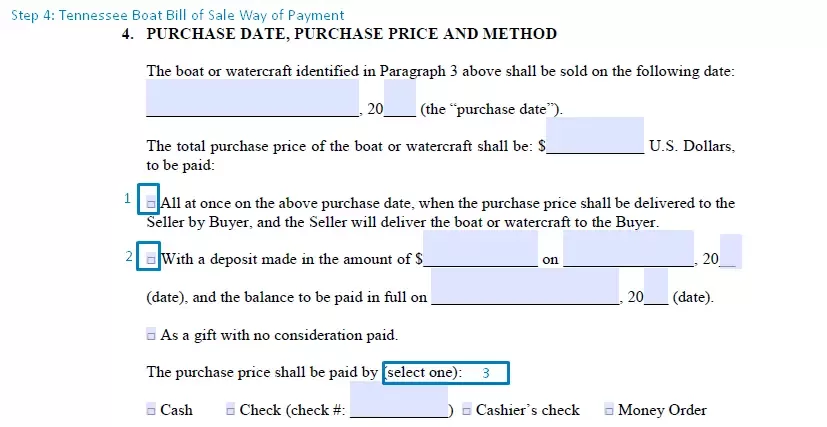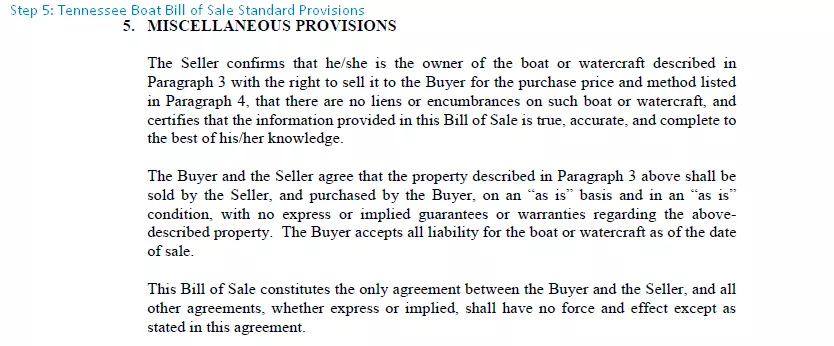Tennessee Boat Bill of Sale Form
If you want to purchase a boat in the State of Tennessee, it is critical to use a Tennessee boat bill of sale form to complete the sale. The Tennessee boat bill of sale is a legal document recognized by the state of Tennessee since it proves the transfer of ownership between the buyer and seller. It provides all of the relevant details regarding the sale such as buyer and seller’s full names, purchase price, date of sale, witnesses, and the notary public information.
The bill of sale template cushions all parties involved from illegal activities arising from the sale agreement. It contains the origin of the boat, and a customer can’t purchase it without notarization to validate the sale. The document is also an essential requirement during the registration and titling process.
Tennessee bill of sale templates – this page will let you discover more about some other bills of sale you can use in Tennessee.
This article will give you an overall idea of what a bill of sale is and how you can benefit from using it.

Build Your Document
Answer a few simple questions to make your document in minutes
Save and Print
Save progress and finish on any device, download and print anytime
Sign and Use
Your valid, lawyer-approved document is ready
Registering a Boat in Tennessee
According to Tennessee laws, all powered boats must have registration numbers before operating in the waterways. Whether you have purchased a brand new or used vessel, you must register it and get a new ownership title (click here for more details on how to make a successful transaction involving boats). Registered vessels from other states can navigate in Tennessee waterways unless it becomes a primary operational midpoint, at which the boat must undergo registration.
After collecting all the documents, you should visit your County Clerk office for the sole purpose of registering your newly acquired watercraft. First, the clerk in charge will issue you with a registration application form that you must complete. Another vital requirement is the bill of sale form that displays all the particulars to register your boat successfully.
If you register your vessel for the first time, the seller or the county clerk should put a verification stamp indicating that the seller has cleared all the sales tax charges.
If you cannot make it to the County Clerk’s office, you can gather all the documents and send them via mail. The clerks will receive and process your registration number and title.
The bill of sale form is an essential document that is required to complete the registration process since it contains all the particulars of the sale. Below are the details in the bill of sale:
- Full names and physical address of the purchaser and seller
- City, State and Zip Code of both parties
- The selling price
- Date of the sale
- Boat details: make, year of manufacture, length, engine condition, model, hull number, and registration number
- Name and signatures of the customer, seller, and witness
- Notary public information
Sometimes, purchasers might have traded in an old vessel for a new one and pay up the difference in the selling price. In such a case, the trade-in information must be captured in the bill of sale, such as the sum of the difference, boat condition, and final cost.
All parties involved in the sale will receive a copy of the sale form and the buyer will get the original document for record-keeping and proof of ownership.
Tennessee Boat Bill of Sale Registration Details
| Boat Type | 1 Year Registration Fees |
| Less than 16 feet | $15 |
| 16 feet to 26 feet | $29 |
| Over 26 feet to 40 feet | $44 |
| Over 40 feet | $59 |
| Source: Tennessee Wildlife Resource Agency | |

How to write Tennessee Boat Bill of Sale
The details below are based on our custom-made bill of sale template. We strongly recommend using the local official document if possible.
Step 1: Indicate when the document is created.

Step 2: Provide the seller’s and purchaser’s details:
- Full legal name
- Address: Street, City of residence, State of residence, Area code
- Contact information: Telephone number, Email address

Step 3: Enter the information about the boat that you are selling:
- Manufacturer
- Title number
- Model year
- Distance traveled (odometer reading)
- Color
- Hull Identification Number (HIN)
- Trailer and motor details (if any)

Step 4: Indicate the transaction method and amount.
This part also requires specifying the date of the transaction and the total sum decided upon by both parties of the deal. After that, decide on one sale method:
- Delivering the full sum as a single payment. One of the simple options: within the same day, the buyer has the boat delivered to them and transfers the full amount.
- A number of payments. With this particular method, you need to specify the dates when the purchaser has to provide the initial and the final payments, as well as their sums.
Next, decide on one transaction method:
- Cash
- Check
- Cashier’s check
- Money order
Lastly, specify if the purchase cost includes all applicable taxes.

Step 5: Go through standard provisions and make sure that both sides have an understanding of them.
This part typically contains the “as-is” passage that implies the item is purchased without a warranties.

Step 6: Place your signature(s) in the appropriate fields.
The buyer is normally not requested to sign the bill of sale. Yet, you will end up more protected against legal issues if both sides sign the document. To avoid risk, the buyer and seller may find a person who’ll witness the deal and sign the form too.

Step 7: Have a notary public witness the form
Despite the fact that notarization is seldom necessary, it may serve as yet another way to guard against legal troubles.
The original bill of sale copy has to be presented to the purchaser as they are going to require it to get a title to their newly bought boat. There are two ways here: you must either prepare and sign two identical bills of sale or make a duplicate for the seller to keep.
